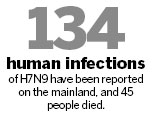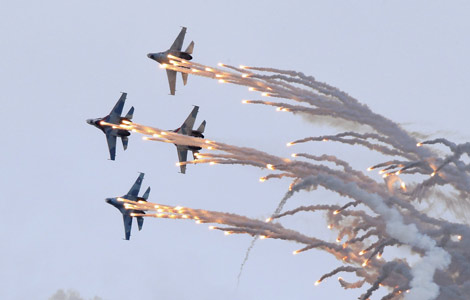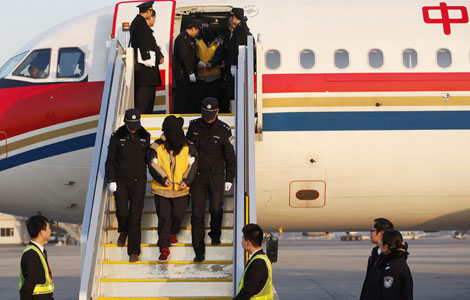Experts: Be alert of H7N9 amid flu seasons
Updated: 2013-09-26 07:57
By Shan Juan (China Daily)
|
||||||||
The avian influenza strain of H7N9 is highly likely to return and affect humans in the autumn and winter on the Chinese mainland, warned Zeng Guang, chief epidemiologist at the Chinese Center for Disease Control and Prevention.
China has remained free of new human H7N9 cases for more than a month since the last fatality - a 51-year-old woman who died of multiple organ failure caused by the virus on Aug 12 in Huizhou, Guangdong province - according to the National Health and Family Planning Commission.
The woman, who was transferred from Langfang, Hebei province, in mid July, worked in slaughtering poultry at a local market.
China has reported 134 human infections of H7N9 on the mainland, including 45 deaths, official statistics show.
"Given that the virus never stopped circulating among birds, humans are also at risk of infection, particularly in the common peak flu season, which usually lasts till spring," Zeng said.
An overlap of the peak flu season and more frequent smoggy weather could make the situation even worse and intervention efforts more complicated, he said.
Flu prevention requires good ventilation, which can't be easily supplied in smoggy weather, he explained.
He urged the public to take precautions such as to avoid staying in public places for long and to be aware of good personal hygiene, including frequent hand-washing.
In addition, to prevent H7N9 infection, "people shouldn't go to live poultry markets", he said.
Feng Zijian, director of the health emergency center of China CDC, echoed the need for public awareness but dismissed the possibility of a widespread human outbreak.

Close surveillance of the virus has so far detected no major mutations that would enable H7N9 to easily spread among humans, he said.
"We'll have joint consultation on Friday with the agriculture departments which oversee virus surveillance of animals to evaluate the epidemic risk in the autumn and winter season to guide more targeted interventions," he said.
The Beijing Health Bureau said on Monday it would further strengthen surveillance and intervention of H7N9 in autumn and winter.
All districts and counties of the capital must give all patients with flu or flu-like symptoms within the jurisdiction H7N9 virus screening upon detection of any human bird flu case, according to an announcement by the bureau.
Last week, US researchers at nine sites throughout the United States began human testing of a potential H7N9 avian influenza vaccine.
The two concurrent Phase II clinical trials, funded by the US National Institutes of Health, aim to collect key information about the safety of the possible vaccine and the immune system responses it induces when administered at varied dosages.
Human cases of H7N9 influenza first emerged in China in February 2013, with the majority of reported infections occurring in the spring, according to the World Health Organization.
Most reported cases involved people who had contact with infected poultry. Although no H7N9 influenza cases have been reported outside of China and the virus has not demonstrated sustained person-to-person transmission, there is concern it could mutate to pose a much greater public health threat.
Shanjuan@chinadaily.com.cn
(China Daily USA 09/26/2013 page6)
Most Viewed
Editor's Picks

|

|

|

|

|

|
Today's Top News
China, Russia issue joint statement on Syria
China to improve policies for overseas investment
Li Tianyi jailed for 10 years for gang rape
China reduces market intervention
Xi promotes 'mass line' campaign
UN resolution on Syria's chemical weapons urged
Youth short on safe sex awareness
Death toll rises to 328 in SW Pakistan's quake
US Weekly

|

|











